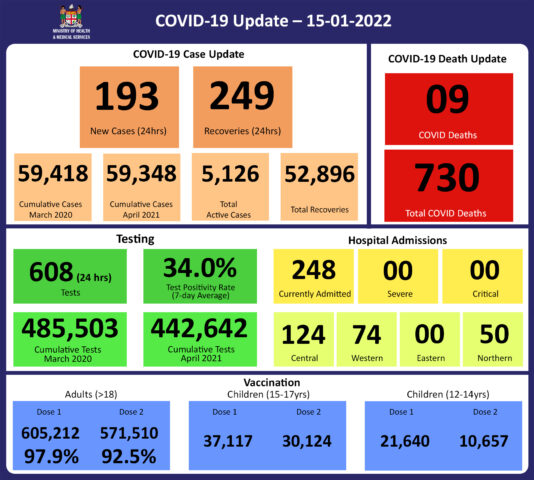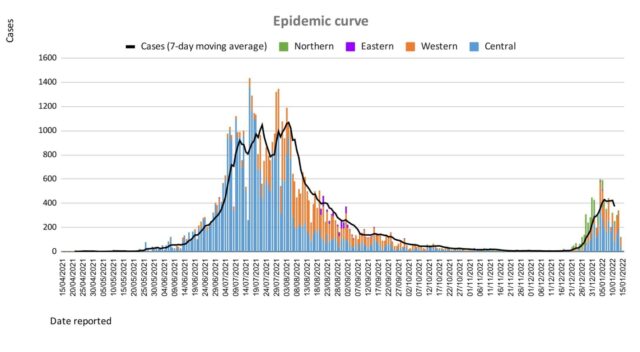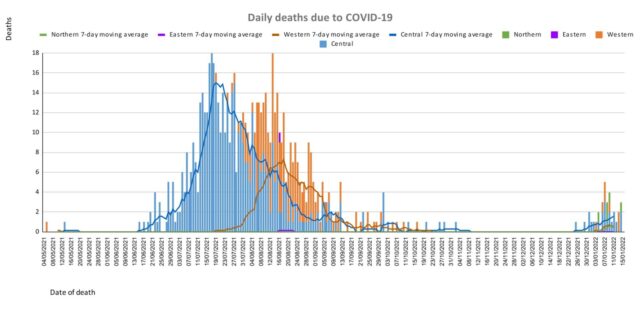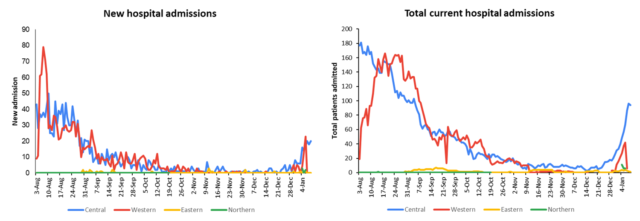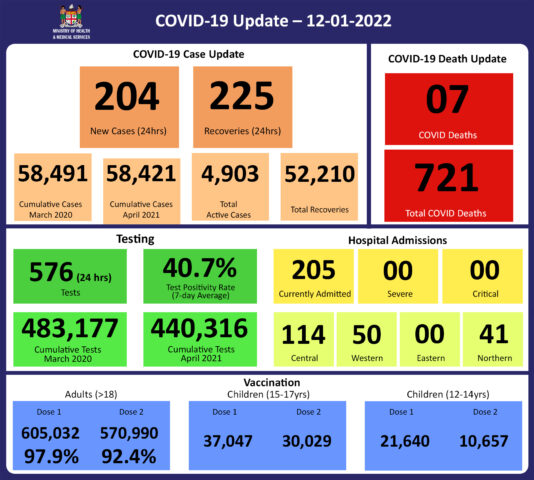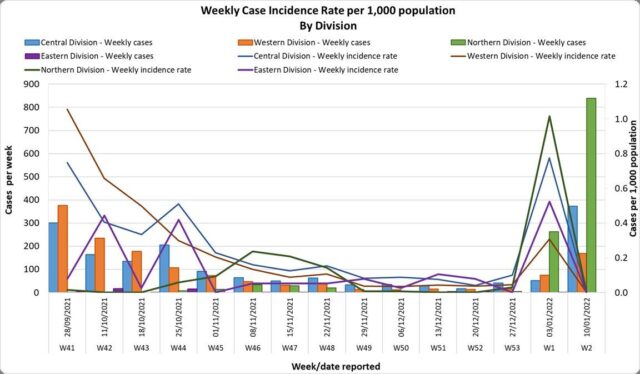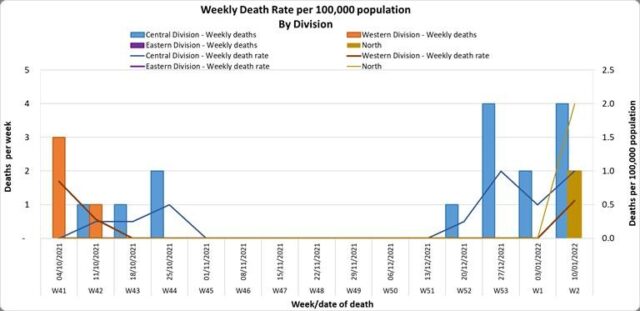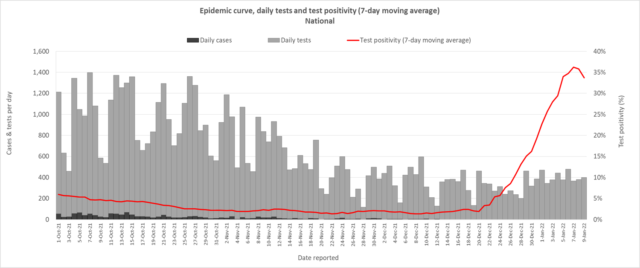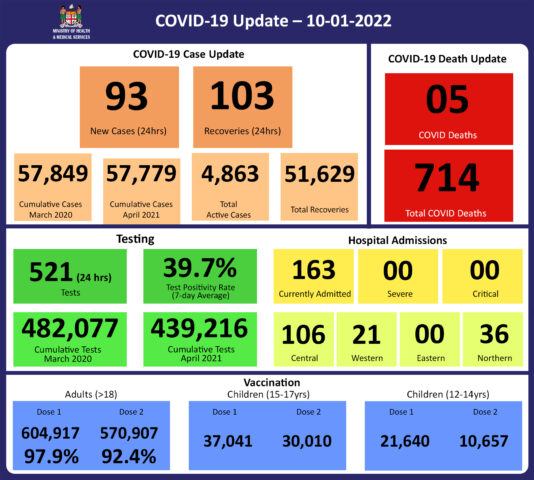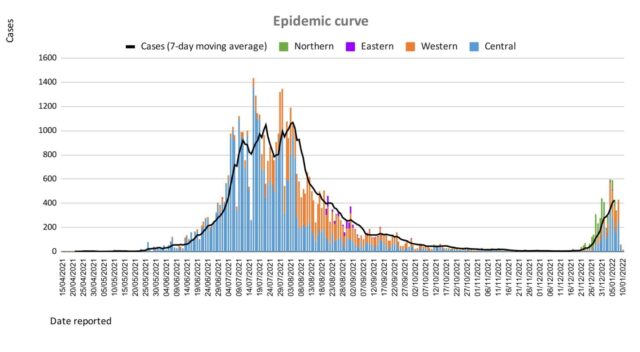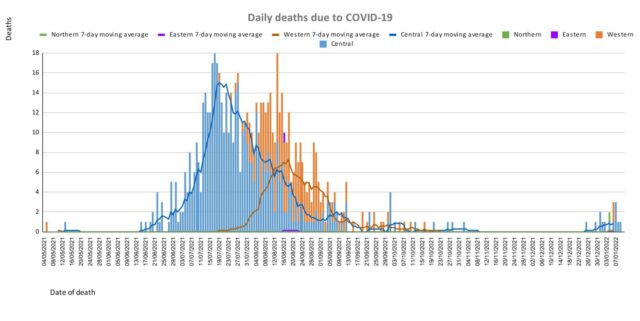COVID-19 Situation Update
Saturday 15th January 2022
| Transmission Update:
Since the last update on 12/01/2022, we have recorded a total of 733 new cases; of which 249 new cases were recorded on 13/01/2022, 291 new cases were recorded on 14/01/2022 and 193 new cases in the last 24 hours ending at 8 am this morning. Of the 733 cases recorded since the last update, 349 cases were recorded in the Central Division; 336 cases were recorded in the Western Division, 48 cases were recorded in the Northern Division, and nil cases in the Eastern Division. Overall, there have been 59,418 cases recorded, with 68% of the cases from the Central Division, 28% of the cases from the Western Division, 1% of the cases from the Eastern Division, and 3% from the Northern Division. Our national 7- day rolling average is 373 daily cases calculated for 11th January 2022. |
| Deaths:
This curve depicts the daily death count by division since the 2nd wave of this outbreak that began in April 2021. Overall, the death rates for the Central, Western, and Northern Divisions indicate an upward trend. There are nine COVID-19 deaths to report. The first COVID-19 death to report is of a 72-year old female from the Northern Division who died on arrival at Savusavu Hospital on 08/01/2022. She was fully vaccinated. The second COVID-19 death to report is of an 87-year old female from the Northern Division who died at home on 09/01/2022. She was not vaccinated. The third COVID-19 death to report is of an 86-year old male from the Central Division who died at home on 11/01/2022. He was not vaccinated The fourth COVID-19 death to report is of a 47-year-old male from the Central Division who died at home on 12/01/2022. He had a pre-existing medical condition and was fully vaccinated. The fifth COVID-19 death to report is of an 81-year old male from the Western Division who died at the Lautoka hospital on 13/01/2022. He had presented to the emergency department on 12/01/2022 in respiratory distress and was admitted to the hospital. He had multiple pre-existing conditions and was fully vaccinated. The sixth COVID-19 death to report is of a 73-year old male from the Western Division who died on arrival at the Lautoka Hospital on 13/01/2022. He had multiple pre-existing medical conditions and was not vaccinated. The seventh COVID-19 death to report is of an 80-year old male from the Central Division who died on arrival at Nausori Health Center on 14/01/2022. He was fully vaccinated. The eighth COVID-19 death to report is of a 60-year old male from the Central Division who died at home on 14/01/2022. He was fully vaccinated. The ninth COVID-19 death to report is of a 60-year old female from the Northern Division who died at home on 14/01/2022. She had pre-existing medical conditions and was not vaccinated. There have been a total of 730 deaths due to COVID-19 in Fiji. Please note that due to the time required by clinical teams to investigate, classify and report deaths, a 4-day interval is given to calculate the 7 days rolling average of deaths, based on the date of death, to help ensure the data collected is complete before the average is reported. Therefore, as of January 10th, 2022, the national 7 days rolling average for COVID-19 deaths per day is 2.3, with a case fatality rate of 1.32%. We have recorded 664 COVID-19 positive patients who died from the serious medical conditions they had before they contracted COVID-19; these are not classified as COVID-19 deaths. |
| Hospitalization:
There is an upward trend in hospitalizations in the Western and Central Divisions as detailed in the graphs. Using the WHO clinical severity classification, 80% (n=199) of the admissions of COVID-19 positive patients are categorized as asymptomatic and mild,9% (n=22) are categorized as moderate and 10% (n=25) as severe with 2 cases in the critical category. Anyone admitted to the hospital is tested before admission, therefore, a significant number of people are admitted to the hospital for non-covid health conditions, but incidentally test positive due to the high transmission in the community. These patients are admitted with COVID-19 rather than for COVID-19. The number of people being admitted for COVID-19 remains low compared to the previous wave. |
Testing:
608 tests have been reported for January 14th, 2022. . The 7-day daily test average is 676 tests per day or 0.8 tests per 1,000 population.
The national 7-day average daily test positivity is 34.0%, which is above the WHO recommendation of 5%. The high positivity rate is an indication of wider spread community transmission.
Public Advisory:
In this current wave, we reiterate that we continue to record lower than expected hospitalizations due to COVID-19 despite the current resurgence in COVID-19 cases throughout Fiji. The impact of our vaccination coverage has been truly encouraging. We have achieved high vaccination in those most likely to be infected and we have fully vaccinated more than 90% of people over the age of 15. The immunity that has been built through vaccination, together with the numbers of people who have gained immunity due to prior infection, means that the vast majority of people infected by Omicron will have a manageable illness and can recover at home.
For our current vaccination campaign, as of January, we have 142, 240 people due to receive the booster dose, of which 48,518 have been vaccinated. Our current stocks of the Moderna vaccine, which is being used as the booster dose, are in excess of 100,000 doses. We are also expecting more of the Pfizer vaccine by the middle of this month. Our booster dose deployment program has been slowed down by the urgent need to safeguard the welfare of our medical staff by ensuring that they get some rest and attend to urgent family needs. Also, the current weather conditions have slowed down our vaccine deployment efforts. However, as of this week, we are now able to deploy more personnel into the field to boost our vaccination teams. The Ministry will also regularly update the vaccination sites on our Ministry of Health websites. Furthermore, the Ministry of Health has almost completed preparations to facilitate the deployment of Pfizer doses both as booster doses for adults over 18 years of age and for children above 12 years of age.
The Ministry is cognizant of the medium- to long-term health impacts of a depressed economy, as well as the negative impact of prolonged poor access to education for our children. We acknowledge that we need an economy that can sustainably function, and we need our children back at school. The Ministry will continue to support the tourism and education sectors to navigate this difficult path towards a better economy and better education standards because we understand that our long-term health as a nation is dependent on both these sectors, as well as the other vital sectors that Fiji depends on to thrive.
The school reopening is based on multiple layers of protection employed within the schools with adherence to covid safe conditions and supported outside the schools with stronger oversight on covid safe community-wide practices. The social gathering restrictions will also add another important layer of protection to reduce the risk of secondary transmission in the schools. In every public setting –– including in school –– good habits can protect us from the Omicron variant, and any future variants that are expected to come. These habits will also protect us from many other debilitating and deadly respiratory infections, both now and in the near future.
In response to feedback received by the Ministry on the reopening of schools, we wish to clarify the Permanent Secretary for Health and Medical Service’s comments on the “minimal risk” to children. In the first instance, a number of higher-quality studies have found minimal to no impact of school closures and reopening on community transmission of the disease. Within households, children and young people transmit SARS-CoV-2 infection at similar levels to adults. However, the studies also show that secondary attack rates from children are lower in school settings than in households, particularly when mitigations are in place. Furthermore, the international experience is that while children do get hospitalized with COVID-19, many of these children are not in the hospital for COVID-19 but instead incidentally tested positive when admitted for other health issues. Severe illness in children remains rare, and even hospitalized children tend to recover well. This has recently been highlighted in a statement by the United Kingdom’s Royal College of Paediatrics and Child Health that says “It is important to note that paediatricians are not reporting Omicron to be a more serious or severe disease in children and young people in the UK. We are also reassured to hear those very few children and young people admitted to hospital with Omicron are needing paediatric intensive care.”
In Fiji, the total number of positive cases recorded in this 3rd Wave is 6520. Whilst this is an underestimate of the actual number of cases, from this sample, 337 or 5% are in the paediatric age group (under the age of 15) and this finding is consistent with the experience expressed by our medical staff. We have 57 COVID-19 positive paediatric admissions so far, and in all the cases, the COVID positive test was incidental to the reason for admission. That means these children were admitted for other medical conditions and just happened to test positive for COVID-19, as all admissions to the hospital are tested. They were admitted with COVID-19 rather than for COVID-19. We have not recorded any admissions in the paediatric age group to date for COVID-19 disease. However, if community transmission is not suppressed, the number of paediatric COVID-19 cases could rise. As such we recommend that families mask up, avoid crowded spaces, and get all eligible kids vaccinated fully.
The positivity rate among travelers remains low and we continue to support international travel through the mitigation measures outlined in our current protocol for travel partner and non-travel partner countries. We are exploring options to transition from hotel stay to homestay for our travelers from travel partner countries. This will require a broad network of private partners who can provide rapid testing sites that can track those that need to be tested and facilitate timely reporting of all results and defaulters. Until we get to that stage we request all our incoming travelers to remain patient and if they find the current arrangement too inconvenient, you may wish to defer your travel to Fiji to a later date. We also urgently remind all outgoing travelers that you need a vaccine certificate to travel out of Fiji. This needs to be submitted at least 7 days prior to travel to the email address covidvaxcertificate@gmail.com.
COVID safe measures
The public is advised that strict adherence to personal COVID safe measures is very important in this 3rd wave. Wear a well-fitted mask that covers your mouth and nose when you are in public places and when attending gatherings. Avoid crowds and poorly ventilated spaces. Maintain at least 2 metres of physical distancing from others when outside your home. Wash your hands frequently with soap and water or use an alcohol-based hand sanitiser. Stay home and do not attend any gatherings if you have any symptoms of COVID-19. Get vaccinated if you are eligible and have not yet been vaccinated. And get a booster dose if you are over the age of 18, and especially if you are at higher risk of severe disease.
Preparing for adverse weather events
While preparing for the adverse weather conditions, the public is reminded to also prepare well for their health needs. Those who take medications regularly for chronic illnesses should ensure that they have an adequate supply of medications with them. All medicines kept at home must be kept in waterproof containers and in dry places away from children and safe from the elements. Families should ensure that the health needs of the vulnerable members of the family such as pregnant mothers, babies and children, the elderly, and the disabled are considered carefully, and plans in place for their safe and immediate evacuation to a health facility if the need arises during a climatic event.
It is important to remember that weather disturbances also cause the increase of climate-sensitive diseases such as leptospirosis, typhoid fever, dengue fever, and diarrhoeal diseases. The public is advised to take actions to protect themselves from these diseases and to prevent the spread of the diseases in our community.
Drinking water should be boiled if the color of the water turns turbid or the regular water supply is frequently interrupted. Stored water should be covered to protect against dirt and pests. Compounds and the home surroundings should be cleared of loose materials and debris that can injure individuals and attract pests. Household rubbish should be disposed of properly, and proper personal protective equipment should be used when outside the household. Children should also be advised on the health risks associated with bathing in flooded water around the home, and in flooded drains, creeks, and rivers, and be discouraged from doing so.
Volcanic eruptions in Tonga
The Ministry encourages the members of the public, in particular those living in low-lying coastal areas, to pay close attention to the advice of the NDMO on the risks and impact of the tsunami and coastal flooding from volcanic eruptions. We will work closely with all government agencies to address the health risks associated with coastal flooding, ash, and debris produced by the eruptions, and invite members of the public affected by these events to report any health manifestation immediately to your local health facility for assessment and care.

